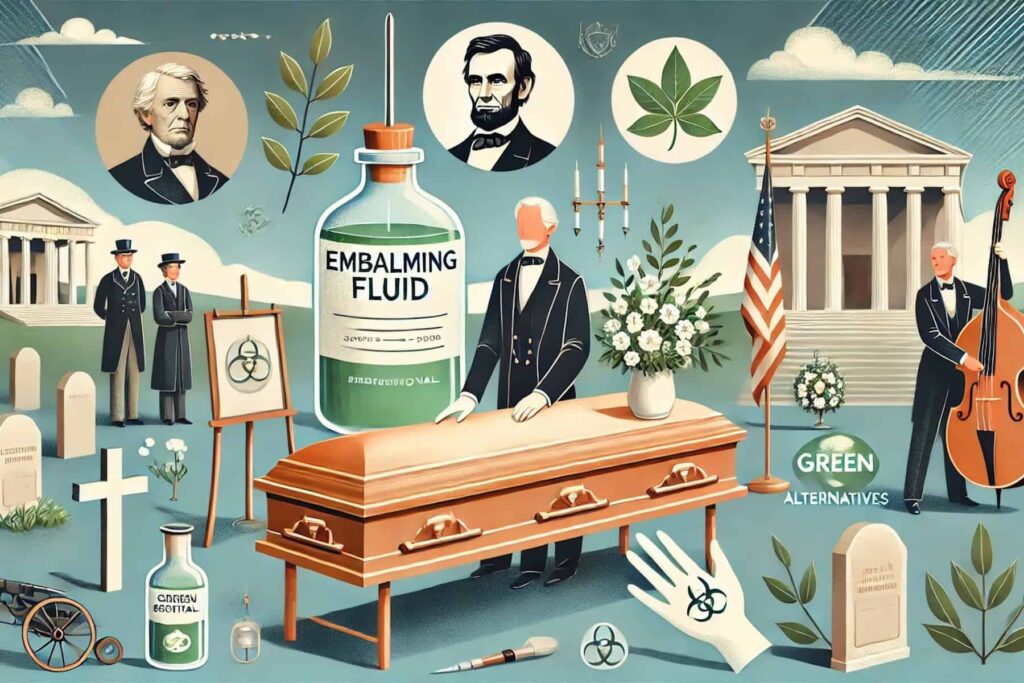To embalm or not to embalm, that is the question for many people who are planning funeral services. And it’s a very important question to answer. Embalming can impact many aspects of death care including the cost, where a body can be buried and the results of an autopsy. Not to mention the impact that embalming fluid can have on the environment.
While many people are familiar with embalming, little is actually known about what it is and the process of using it. As a funeral director I get a lot of questions about what embalming is exactly. So, I created a comprehensive embalming FAQ with all of the most common questions that I answer.
If you have a question about embalming that isn’t in the FAQ, reach out and I’ll be happy to answer it for you!
What does it mean to be embalmed?
Embalming is a procedure that is done shortly after death to preserve the remains by slowing the decomposition process. There are four techniques for embalming, all of which may be used during the multi-stage process. Essentially, for embalming to happen body fluids are removed and replaced by embalming fluid. If you want the details, you can read more about how embalming is done.
What is embalming fluid?
There are a number of embalming fluid formulas with unique ingredients lists. Embalming fluids serve three primary purposes all that are aimed at inhibiting decomposition. They are formulated to dehydrate the body, harden the tissue and kill the bacteria and microbes that facilitate the decomposition of body tissue.
What exactly is in embalming fluid is hard to say since there isn’t one standard formula. Typically, embalming fluid will contain water, solvents, disinfectants and conditioners. Most embalming fluids also contain formaldehyde as a preservative. This is what makes embalming so dangerous because formaldehyde is a known carcinogen. A carcinogen is a substance that is known to significantly increase the risk of cancer.
When did embalming first become a thing?
While the concept of embalming has been around for centuries, modern day embalming practices didn’t become common practice until the Civil War era. A lot changed dramatically in America at that time and death care was one of them. Doctors began using embalming on the bodies of soldiers that were killed in the war so that they could be transported back home for funeral services.
Then President Lincoln was assassinated. Afterward his body was transported back to his hometown of Springfield, IL, but there were a number of stops along the 1,600-mile route. In the entourage was an embalmer who kept Lincoln’s body preserved throughout the trip. Many people took the opportunity to see the late president’s body as the procession passed through their cities, and they also witnessed what modern embalming could do. It sold many people on the idea, which soon became the norm in America.
How long does embalming last?
Embalming isn’t meant for permanent preservation. However, the goal is to keep the body perfectly preserved for at least a week so that funeral services can be held. If the body is buried in a water-tight coffin the effects can last a few months. But over time decomposition slowly occurs, and after 5-10 years even with burial all that is left are the bones.
If you’re embalmed can you be cremated?
Yes, but it could limit what you do with the cremated remains afterward. Embalming before cremation shouldn’t affect the composition of the cremains, but green cemeteries aren’t taking any risks. If you want to bury cremains in a green cemetery that may not be possible if the person was embalmed.
What does the Bible say about embalming?
Religion plays a big role in funeral decisions for many people. Different religions have different practices and what is considered acceptable for death care. Religious scholars often turn to the bible whenever there’s a debate over what is considered an acceptable death care practice. The problem in this case is there are almost no mentions of embalming in the bible whatsoever.
In fact, there are only two sure mentions of embalming. The two bible passages (Genesis 50:2-3 and Genesis 50:26) discuss the use of aromatics to preserve the bodies of Jacob and Joseph. However, what this really reflected was the common disposition practices of Egypt at the time, which is where they died. And embalming was only used in those cases to preserve the bodies for burial back home.
Wondering what the bible says about cremation? We’ve covered that topic too!
Do you need to be embalmed?
Nope. The ancient Egyptians proved toxic embalming fluid wasn’t needed thousands of years ago. There are other methods that can be used to preserve a body without the need for embalming. Wondering what those other preservation methods are? Then check out more details on embalming alternatives.
Is embalming bad for the environment?
In a word, yes. For many years, toxic embalming fluid was put into bodies that were then buried. Eventually, the effects of the embalming fluid wear off, the body tissue dissolves and the embalming fluid can leach out. Once it does, the embalming fluid can get into the ground and even the groundwater. Given that some of the ingredients are toxic, this is an obvious environmental concern.
We’ve written a full rundown of all the ways embalming fluid is bad for the environment if you’d like to know more about its impact.
Why does Cremation.Green avoid using embalming fluid?
That’s a great question. There are a lot of reasons why we choose to not embalm. For starters, it just isn’t necessary. There are other body preservation options that are better for the health of people and the environment, which is what we care about the most.
Forgoing the embalming fluid is also a huge cost reducer. We understand that financial stress that can come with funeral services. Eliminating one of the most expensive aspects is just one way we make the entire process less stressful.
If embalming seems like something you could do without, Cremation.Green is the type of funeral home you’re looking for. We provide eco-friendly death care services that have a minimal impact on the environment. We can be reached 24 hours a day by phone, text or email to answer your questions.






